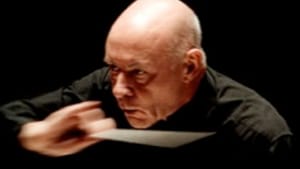Stay in the Loop
BSR publishes on a weekly schedule, with an email newsletter every Wednesday and Thursday morning. There’s no paywall, and subscribing is always free.
The authority of Eschenbach,
the snideness of Dobrin
DAN COREN
Has any single piece of classical music influenced subsequent composers as profoundly as Stravinsky’s Rite of Spring? Does any other work remain so innovative and mesmerizing nearly a century after its composition?
For me, the answer is no— not even Beethoven’s Ninth. So it was worth sitting inside Verizon Hall on a crystalline autumn Sunday afternoon to hear Christoph Eschenbach open the Orchestra season with this inexhaustible invocation of primitive awe and violence. Besides, a live performance of the Rite of Spring on the day of the autumnal equinox is surely a once-in-a-lifetime event.
The one time I saw Stravinsky himself lead the Rite, even he used a score. (To be fair, he was physically on his last legs and didn’t seem to be doing much more than glaring at the New York Philharmonic while opening and closing his right hand.) Eschenbach, however, conducted from memory— in itself a remarkable feat— and he conducted with the same ferocious authority that he used to bring as a pianist to the late Beethoven sonatas. The Orchestra, helped by the almost surrealistic clarity of Verizon Hall’s acoustics– acoustics that are perfect for Stravinsky’s lapidary wind and percussion writing— sounded superb.
The Stravinsky was paired with the Tchaikovsky First Symphony. In his review of Friday’s performance of this same music, the Inquirer’s critic Peter Dobrin— inspired to heights of snideness as he invariably is by Eschenbach— had yet again called into question Eschenbach’s ability to conduct a slow tempo. So I listened and watched with special care. Dobrin has played in orchestras and I haven’t, so I’m sure he’s aware of details that I miss. But I too am a musician and I’ve sung under many conductors, good and bad—and, to me, Eschenbach’s beat looked clear throughout. The Tchaikovsky First itself, though, I must say, simply isn’t worth all this fuss.
the snideness of Dobrin
DAN COREN
Has any single piece of classical music influenced subsequent composers as profoundly as Stravinsky’s Rite of Spring? Does any other work remain so innovative and mesmerizing nearly a century after its composition?
For me, the answer is no— not even Beethoven’s Ninth. So it was worth sitting inside Verizon Hall on a crystalline autumn Sunday afternoon to hear Christoph Eschenbach open the Orchestra season with this inexhaustible invocation of primitive awe and violence. Besides, a live performance of the Rite of Spring on the day of the autumnal equinox is surely a once-in-a-lifetime event.
The one time I saw Stravinsky himself lead the Rite, even he used a score. (To be fair, he was physically on his last legs and didn’t seem to be doing much more than glaring at the New York Philharmonic while opening and closing his right hand.) Eschenbach, however, conducted from memory— in itself a remarkable feat— and he conducted with the same ferocious authority that he used to bring as a pianist to the late Beethoven sonatas. The Orchestra, helped by the almost surrealistic clarity of Verizon Hall’s acoustics– acoustics that are perfect for Stravinsky’s lapidary wind and percussion writing— sounded superb.
The Stravinsky was paired with the Tchaikovsky First Symphony. In his review of Friday’s performance of this same music, the Inquirer’s critic Peter Dobrin— inspired to heights of snideness as he invariably is by Eschenbach— had yet again called into question Eschenbach’s ability to conduct a slow tempo. So I listened and watched with special care. Dobrin has played in orchestras and I haven’t, so I’m sure he’s aware of details that I miss. But I too am a musician and I’ve sung under many conductors, good and bad—and, to me, Eschenbach’s beat looked clear throughout. The Tchaikovsky First itself, though, I must say, simply isn’t worth all this fuss.
Sign up for our newsletter
All of the week's new articles, all in one place. Sign up for the free weekly BSR newsletters, and don't miss a conversation.

 Dan Coren
Dan Coren
